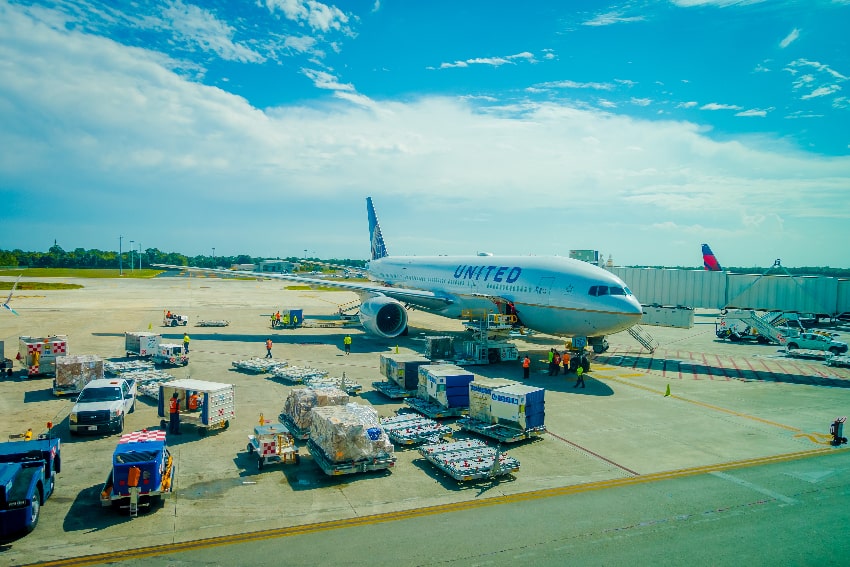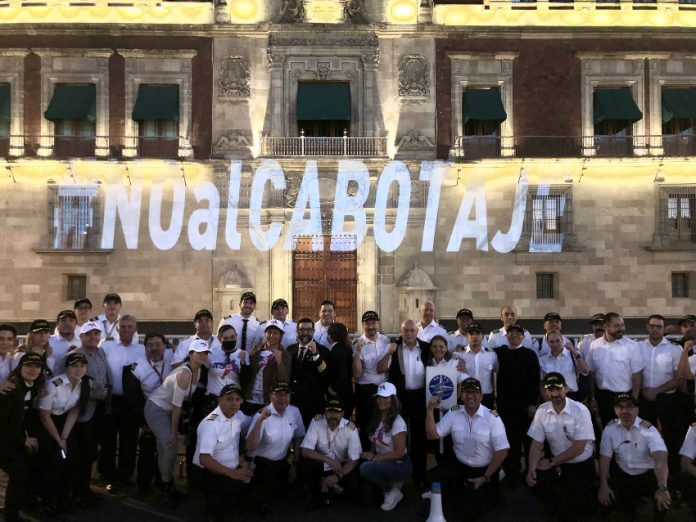Aviation sector workers protested in Mexico City on Tuesday against a legislative proposal to allow foreign airlines to fly domestic routes in Mexico.
President López Obrador sent a foreign airlines cabotage bill to Congress in December, formalizing a proposal he first floated in October.
On Tuesday members of the National Union of Workers, which encompasses the pilots’ association ASPA, protested the bill in front of the National Palace after participating in a march to the Zócalo, the capital’s central square.

The protesters projected the message #NoalCABOTAJE, or #NotoCABOTAGE, onto the facade of the National Palace, which is both the seat of executive power and López Obrador’s residence.
Cabotage refers to the right to operate transport routes within a particular country or territory. Under López Obrador’s proposal, a foreign airline could fly into Mexico City from abroad and then transport passengers on domestic flights to destinations such as Cancún or Los Cabos.
Protesters chanted “the skies aren’t sold, the skies are defended” and displayed signs with messages such as “the skies of Mexico for Mexicans,” according to a Reforma newspaper report.
ASPA says that the proposed change to the Civil Aviation Law poses a threat to Mexican aviation sector jobs.
It noted in a statement that foreign airlines are prohibited from flying domestic routes in many countries around the world including Mexico “as it has been proven” that allowing them to do so “doesn’t generate competitiveness or benefit passengers.”
“On the contrary, the national [aviation] industry would be affected in the short term,” ASPA said.
In the Zócalo on Tuesday, the president of the Mexican College of Pilots, Ángel Domínguez Catzín, denounced the taking of decisions “without knowledge and without taking into account the opinion of workers.”
In a message directed to authorities, he declared that “if we want to talk about a true transformation [of Mexico], we need to do it … [in a way that makes] sense for our country.”
López Obrador in October said that allowing foreign airlines to fly domestic routes would increase competition and thus help place downward pressure on ticket prices. His bill asserts that allowing foreign airlines to operate within Mexico will lead to an expansion of regional routes and “air services will be of better quality and efficiency at the lowest cost.”
López Obrador has complained about the lack of flights between regional destinations in Mexico, but ASPA said that allowing foreign airlines to operate here won’t help remedy that problem as they would only fly “profitable routes” between major cities.
Another way the president is aiming to address the lack of air routes between some destinations is via the creation of a state-owned, army-run commercial airline. He said in December that the new government airline – which is set to rekindle the defunct Mexicana brand – will begin operations in late 2023.
With reports from Reforma and El Universal
